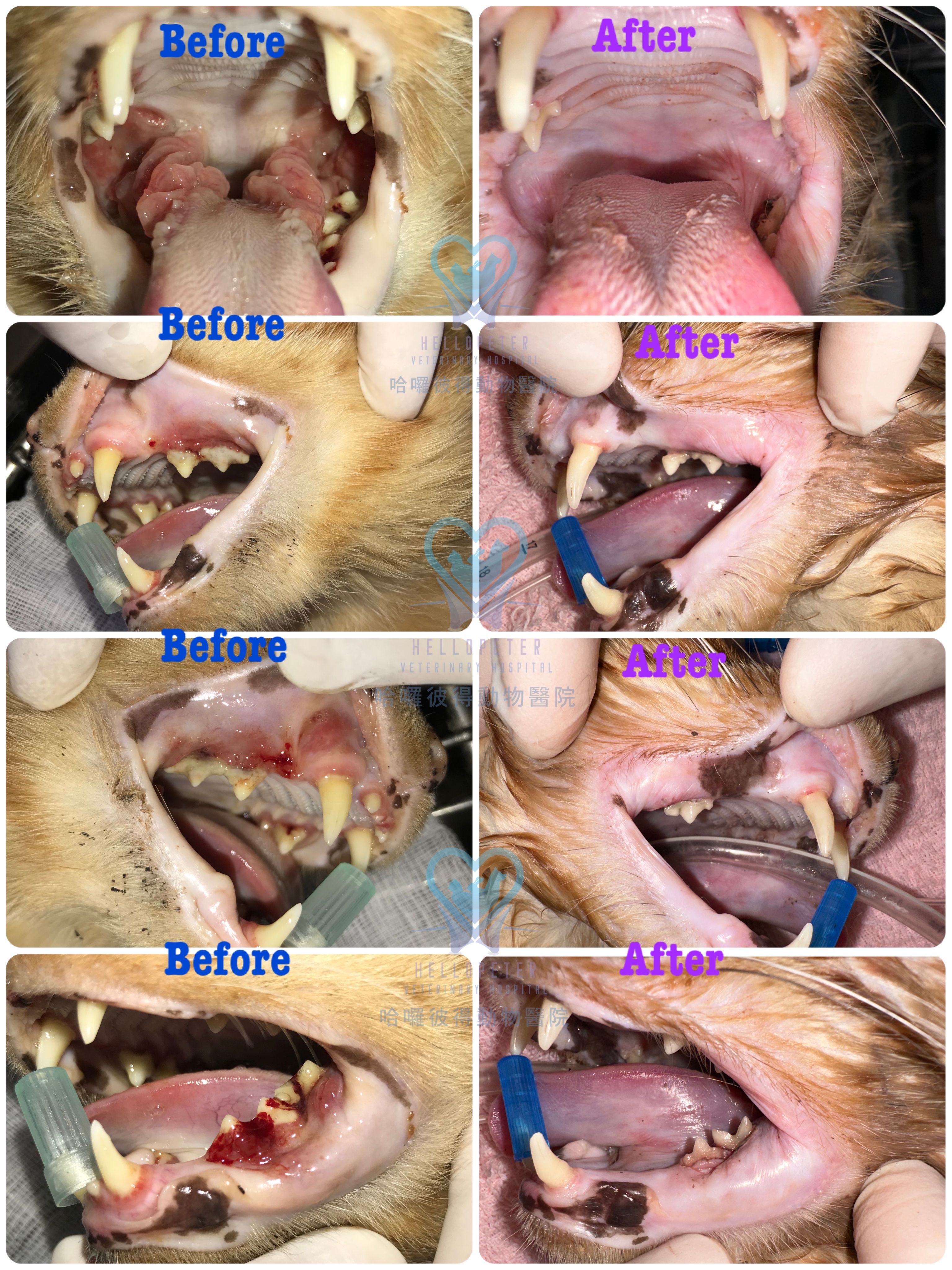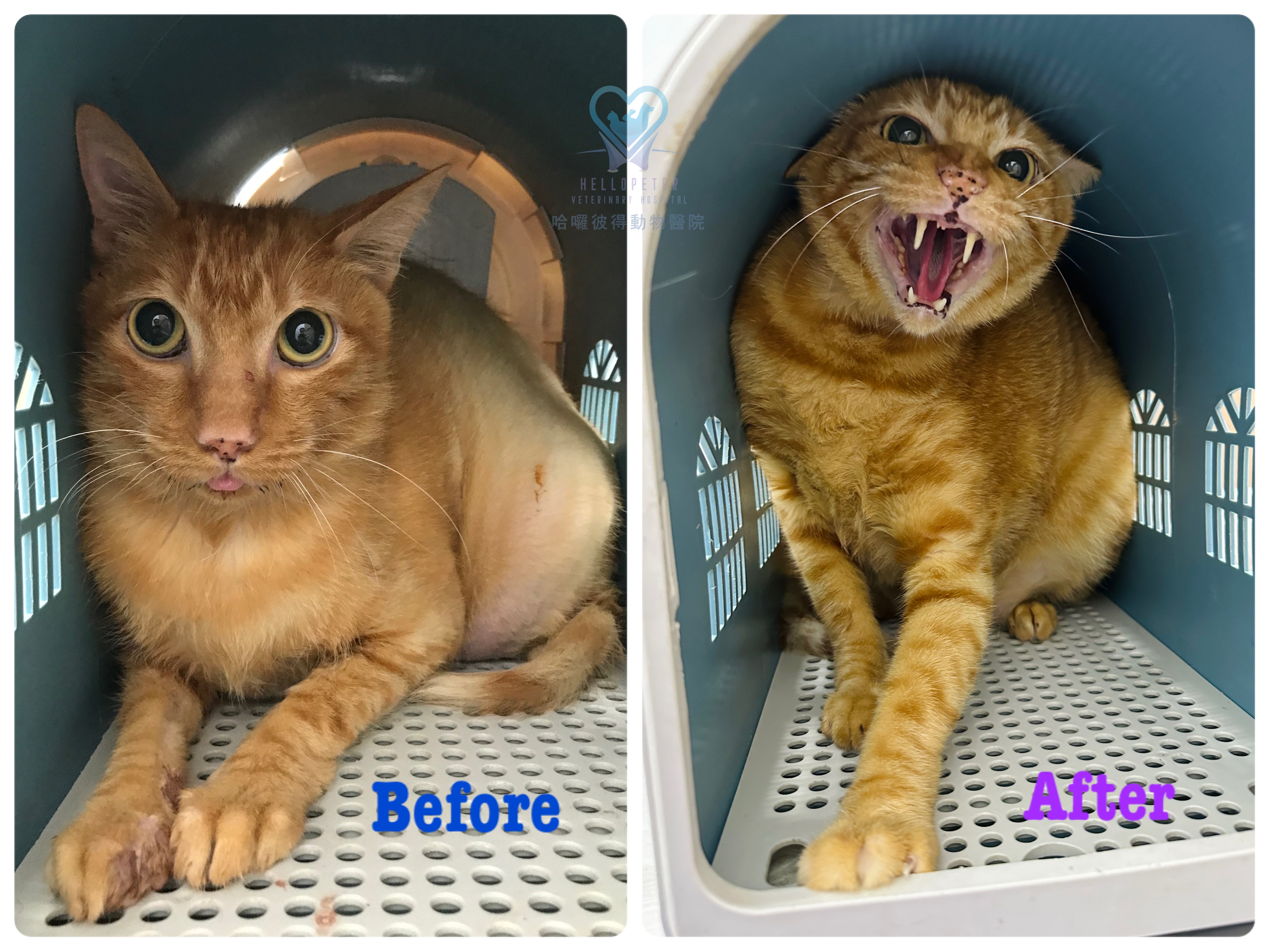【2023.07.07新增】治癒5歲嚴重增生型的口炎公橘貓
【Added on July 7, 2023】Successful Treatment of Severe Proliferative Stomatitis in a 5-Year-Old Orange Tabby Male Cat
這是我們治療過棘手且病況嚴重的貓慢性齒齦口炎(Feline chronic gingivostomatitis, FCGS),以下簡稱口炎)案例之一。

 可頌是一隻已節育的混種公橘貓,患有嚴重的口炎 (FCGS),先前的醫院是使用類固醇控制病情,但已經開始出現藥物耐受性,飼主遂帶貓來本院接受陳重威獸醫師獨創的牙齦黏膜置換手術 (Mucogingival Replacement Surgery, MGRS) 進行口炎 (FCGS)治療,開始治療時貓咪是3歲4個月,牙齦黏膜置換手術 (MGRS) 療程結束時5歲4個月。
可頌是一隻已節育的混種公橘貓,患有嚴重的口炎 (FCGS),先前的醫院是使用類固醇控制病情,但已經開始出現藥物耐受性,飼主遂帶貓來本院接受陳重威獸醫師獨創的牙齦黏膜置換手術 (Mucogingival Replacement Surgery, MGRS) 進行口炎 (FCGS)治療,開始治療時貓咪是3歲4個月,牙齦黏膜置換手術 (MGRS) 療程結束時5歲4個月。
可頌也是參加陳重威獸醫師在高雄醫學大學口腔衛生研究所進行貓口炎治療研究計畫的貓病患。
患貓的口炎 (FCGS) 範圍從頰側、舌下一路蔓延到咽喉處,而且有嚴重的增生,這導致貓有嚴重口臭、流口水與流血不止、吞嚥困難等,而且可頌的發炎反應也比大部份的口炎貓咪還要嚴重,這些增加了治療的難度。
經過2年的牙齦黏膜置換手術 (MGRS) 治療後,可頌的口炎 (FCGS) 終於完全治癒,食慾良好,精神活力極佳,體重從5.7kg上升至6.9kg,正常生活即可,不需要打針吃藥。
由於可頌本身也是嚴重牙周病的病患,雖然口炎 (FCGS) 順利治癒了,但還是需要每天刷牙及定期洗牙,保持良好的口腔衛生,才能確保口腔的健康。
非常感謝飼主願意相信我們並堅持完成療程。
貓咪慢性齒齦口炎(FCGS)是常見的貓咪口腔疾病之一,常見的症狀為:
1. 牙齦及口腔黏膜紅腫,甚至潰瘍或增生,口腔所有軟組織,包含牙齦、兩頰舌頭兩側、舌頭下方、嘴角至咽喉部的口腔黏膜都會有紅腫潰瘍或增生。
2. 貓咪會因為口腔疼痛會減少進食,甚至不願意進食,或是吃飯喝水會不斷甩頭、使用前腳撥動嘴巴。
3. 口水因潰瘍多半都有異味,甚至帶有腐肉味。
目前普遍的治療多為施打長效型類固醇針劑或是口服類固醇藥劑,搭配抗生素,以及拔牙,但個體治療效果落差較大,且拔牙容易使貓咪口腔塌陷、齒槽骨萎縮,貓咪需要終生服用藥物,無法斷藥。
陳重威獸醫師獨創的牙齦黏膜置換手術 (Mucogingival Replacement Surgery, MGRS)便是希望可以克服上述口炎治療的後遺症及困境,讓患有FCGS的貓咪痊癒後不必長期吃藥,可以恢復病前的正常生活。
想看更多本院以牙齦黏膜置換手術 (Mucogingival Replacement Surgery, MGRS) 治癒好的貓咪個案,請參考官網的【牙齦黏膜置換手術(MGRS)治療貓狗口炎個案】專區(www.hellopeter.com.tw/contents-4.html)或FB粉專專屬相簿(https://reurl.cc/jlAQAZ)
This is one of the patients in which we successfully treated a challenging and severe condition known as Feline Chronic Gingivostomatitis (FCGS), also referred to as stomatitis.
“
Croissant” is a neutered mixed-breed orange tabby male cat, suffered from severe stomatitis (FCGS). Previous treatments at another hospital involved the use of steroids to control the condition, but drug resistance had started to develop. As a result, the owner brought him to our hospital to undergo Dr. Chung-Wei Chen (Dr. Richard Chen)'s innovative procedure called Mucogingival Replacement Surgery (MGRS) for stomatitis (FCGS) treatment. Croissant was 3 years and 4 months old at the start of the treatment and 5 years and 4 months old when the MGRS treatment course was completed.
Croissant also participated as a cat patient in Dr. Chung-Wei Chen (Dr. Richard Chen)'s research project on stomatitis (FCGS) at the Kaohsiung Medical University (KMU) Department of Oral Hygiene.
The stomatitis (FCGS) in the affected cat extended from the buccal and sublingual to the oropharynx area, accompanied by severe proliferation. This caused the patient to have severe halitosis, excessive salivation, continuous bleeding, and difficulty swallowing. Moreover, Croissant's inflammatory response was even more severe than most cats with stomatitis (FCGS), which increased the complexity of the treatment.
After 2 years of MGRS treatment, Croissant's stomatitis (FCGS) was finally completely healed. He regained a good appetite, exhibited excellent vitality, and his weight increased from 5.7 kg to 6.9 kg. He can now lead a normal life without the need for injections or medication.
Although Croissant's stomatitis (FCGS) has been successfully cured, he remains a patient with severe periodontal disease. Therefore, daily toothbrushing and regular scaling are still necessary to maintain good oral hygiene and ensure the health of his oral cavity.
We would like to express our deepest gratitude to the owner for having faith in us and persevering through the entire treatment course.
Feline chronic gingivostomatitis (FCGS) is one of the common oral diseases in cats. The main symptoms are:
1. The gingiva and oral mucosa are red, swollen, ulcers or hyperplasia. All soft tissues in the mouth, including the gingiva and all parts of the oral mucosa (including buccal, lingual, sublingual and oropharynx, etc.), will have redness, ulceration or hyperplasia.
2. Cats will lose their appetite or even refuse to eat because of mouth pain, or they will keep shaking their heads and scratching their mouths with their front feet when eating and drinking.
3. The patient's saliva usually has a peculiar smell, even putrefactive odor, due to ulcers.
At present, the most common treatments are long-acting steroid injections or oral steroids, combined with antibiotics, and tooth extraction, etc., but the effect of individual treatment varies greatly, furthermore, tooth extraction will likely cause the cat's oral cavity to collapse and alveolar bone loss. They need lifelong medication and can't stop it.
Dr. Chung-Wei Chen's original Mucogingival Replacement Surgery (MGRS) aims to solve the above-mentioned sequelae and difficulties in the treatment of stomatitis, and make cats with FCGS no longer need to take medicine for a long time after recovery, and return to the normal life they had before the illness.
If you want to see more cat patients cured by MGRS in our hospital, please refer to our official website (www.hellopeter.com.tw/contents-4. html) or Facebook fan page album (https://reurl.cc/jlAQAZ).
哈囉彼得動物醫院 |HelloPeter Veterinary Hospital
院長 陳重威獸醫師 |Dr. Richard Chen
YouTube頻道:【阿威獸醫師的開口啟齒】www.youtube.com/@DrRichardChen_vet
(04)2472-8828
台中市南屯區東興路二段29號|No. 29, Sec. 2, Dongxing Rd., Nantun Dist., Taichung City 408, Taiwan
醫院官網Website: www.hellopeter.com.tw
門診時間:週一至週五10:00~13:00、15:00~20:30(門診為預約制),週六可接受預約門診及手術,週日公休。
#陳重威獸醫師 #fcgs #hellpeterveterinaryhospital #動物牙科推薦 #寵物牙科推薦 #牙齦黏膜置換手術 #貓口炎 #治療貓口炎 #MGRS #貓慢性齒齦口炎 #MucogingivalReplacementSurgery #貓口炎專家 #貓口炎權威
#貓 #貓牙周病 #口炎貓 #牙周病治療 #cat #dog
#動物口腔外科 #獸醫牙科 #pet #牙科獸醫推薦 #貓奴 #貓星人




